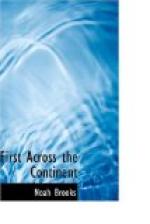There was nothing left to do but to return to Hungry Creek. Finding a scanty supply of grass, they camped under most depressing circumstances; their outlook now was the passing of four or five days in the midst of snows from ten to fifteen feet deep, with no guide, no road, and no forage. In this emergency, two men were sent back to the Chopunnish country to hurry up the Indians who had promised to accompany them over the mountains; and, to insure a guide, these men were authorized to offer a rifle as a reward for any one who would undertake the task. For the present, it was thought best to return to Quamash flats.
Chapter XXIII — Crossing the Bitter Root Mountains
Disasters many kept pace with the unhappy explorers on their way back to Quamash flats after their rebuff at the base of the Bitter Root Mountains. One of the horses fell down a rough and rocky place, carrying his rider with him; but fortunately neither horse nor man was killed. Next, a man, sent ahead to cut down the brush that blocked the path, cut himself badly on the inside of his thigh and bled copiously. The hunters sent out for game returned empty-handed. The fishermen caught no fish, but broke the two Indian gigs, or contrivances for catching fish, with which they had been provided. The stock of salt had given out, the bulk of their supply having been left on the mountain. Several large mushrooms were brought in by Cruzatte, but these were eaten without pepper, salt, or any kind of grease,—“a very tasteless, insipid food,” as the journal says. To crown all, the mosquitoes were pestilential in their numbers and venom.
Nevertheless, the leaders of the expedition were determined to press on and pass the Bitter Root Mountains as soon as a slight rest at Quamash flats should be had. If they should tarry until the snows melted from the trail, they would be too late to reach the United States that winter and would be compelled to pass the next winter at some camp high up on the Missouri, as they had passed one winter at Fort Mandan, on their way out. This is the course of argument which Captain Lewis and Clark took to persuade each other as to the best way out of their difficulties:—
“The snows have formed a hard, coarse bed without crust, on which the horses walk safely without slipping; the chief difficulty, therefore, is to find the road. In this we may be assisted by the circumstance that, though generally ten feet in depth, the snow has been thrown off by the thick and spreading branches of the trees, and from round the trunk; while the warmth of the trunk itself, acquired by the reflection of the sun, or communicated by natural heat of the earth, which is never frozen under these masses, has dissolved the snow so much that immediately at the roots its depth is not more than one or two feet. We therefore hope that the marks of the baggage rubbing against the trees may still be perceived; and we have decided,




